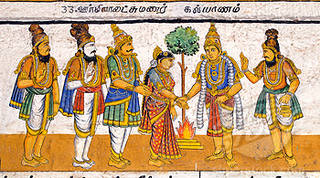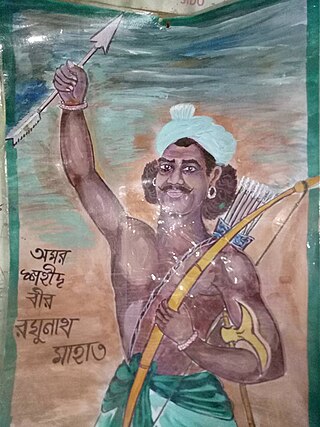Related Research Articles

Kabaddi is a contact team sport played between two teams of seven players, originating in ancient India. The objective of the game is for a single player on offence, referred to as a "raider", to run into the opposing team's half of the court, touch out as many of their players as possible, and return to their own half of the court, all without being tackled by the defenders in 30 seconds. Points are scored for each player tagged by the raider, while the opposing team earns a point for stopping the raider. Players are taken out of the game if they are touched or tackled, but return to the game after each point scored by their team from a tag or tackle.

Lakshmana, also known as Laxmana, Saumitra and Ramanuja, is a Hindu god and the younger brother of Rama in the Hindu epic Ramayana. He is considered as an incarnation of Shesha, the lord of serpents. Lakshmana was married to Urmila, and is known for his loyalty and dedication towards Rama.

Shatrughna, also known as Ripudaman, is the younger brother of Rama, and King of Madhupura and Vidisha, in the Hindu epic Ramayana. He is considered as an incarnation of the Sudarshana Chakra of god Vishnu, and was married to Shrutakirti.

Tag is a playground game involving one or more players chasing other players in an attempt to "tag" and mark them out of play, typically by touching with a hand. There are many variations; most forms have no teams, scores, or equipment. Usually when a person is tagged, the tagger says, "It!" or "Tag, you're 'It'!" The last one tagged during tag is "It" for the next round. The game is known by other names in various parts of the world, including "running and catching" in India and "catch and cook" in the Middle East.

Kho kho is a traditional South Asian sport that dates to ancient India. It is the second-most popular traditional tag game in the Indian subcontinent after kabaddi. Kho kho is played on a rectangular court with a central lane connecting two poles which are at either end of the court. During the game, nine players from the chasing team are on the field, with eight of them sitting (crouched) in the central lane, while three runners from the defending team run around the court and try to avoid being touched. Each sitting player on the chasing team faces the opposite half of the field that their adjacent teammates are facing.

Urmila, is a Hindu goddess and the princess of Videha in the Hindu epic Ramayana. She is considered to be an avatāra of Nagalakshmi, the serpent goddess. Urmila was married to Lakshmana and is known for her dedication towards her husband, for her courage and sacrifice.

Shrutakirti is a princess of Videha, in the Hindu epic Ramayana. She is the wife of Shatrughna and is considered an incarnation of the disc of goddess Lakshmi. Shrutakirti is known for her foresight and dedication.

Mandavi is a princess of Videha in the Hindu epic Ramayana. She is the wife of Bharata and is considered an incarnation of the conch shell of goddess Lakshmi. Mandavi is known for her sacrifice and perseverance.
Darebase or dare base, also known as prisoners' baseChevy Chace, or Release the Prisoner and originally as bars, base or prisoners' bars, is a tag game between two or more teams on an open field that places a premium on speed and agility. Darebase holds some similarity to capture the flag in its basic premise of chase, capture, and conquer. It differs in that the game field consists of a large no-man's land with team bases occupying two opposite ends of the field and in the methods of achieving victory. A variation called stealbase uses an object that may be either touched or stolen to achieve victory.

Ravi Chaturvedi is an Indian sports commentator and author of twenty seven books on cricket, including World Cup Cricket: A Compendium, known to be first Indian sports commentator in Hindi. He was honored by the Government of India, in 2012, with the fourth highest Indian civilian award of Padma Shri.. Matu Shri and Khel Samrat awards for best Hindi commentator and as educationist offered membership by India International Intellectual Society. He has been on Board of Directors, Delhi District Cricket Association (DDCA), member, Bombay Natural History Society and on the advisory committee of The National Zoology Park.
The Nagpuria people, also Nagpuri or Sadan, are an Indo-Aryan speaking ethnolinguistic group who are the native speakers of the Nagpuri language and natives of the western Chota Nagpur Plateau region of Indian states of Jharkhand, Bihar, Chhattisgarh and Odisha.

Raghunath Mahato was an Indian revolutionary, one of the main leaders of the Chuar Rebellion from the Kudmi Mahato community. He led a revolt against the East India Company in 1769.

Bengali traditional games are traditional games that are played in rural parts of the historical region of Bengal. These games are typically played outside with limited resources. Many games have similarities to other traditional South Asian games.
Krishnaut or Kishnaut Ahir is a clan of the Yadav (Ahir) caste found in Bihar, Jharkhand and Nepal. The term Krishnaut which to them denotes their descent from Lord Krishna.

India has several traditional games and sports, some of which have been played for thousands of years. Their popularity has greatly declined in the modern era, with Western sports having overtaken them during the British Raj, and the Indian government now making some efforts to revive them. Many of these games do not require much equipment or playing space. Some of them are only played in certain regions of India, or may be known by different names and played under different rules and regulations in different regions of the country. Many Indian games are also similar to other traditional South Asian games.

Vidya Vindu Singh is an Indian author in Hindi and Awadhi languages. She is best known for her broad work in folk and children's literature. Singh has been awarded Padma Shri in 2022 by the Government of India for her contributions in the field of literature & education.
Nagpuri culture refers to the culture of the Nagpuria people, the native speakers of the Nagpuri language, which includes literature, festivals, folk song and dance. It is also referred to as the culture related to the Nagpuri language.

Pakistan has many traditional games played in the rural and urban areas of the country.

South Asia has many traditional games and sports. Two of them, kabaddi and kho-kho, are played at the South Asian Games, with kabaddi also featuring at the Asian Games. Many of these games are played across the entire subcontinent under different names and with some rule variations, while some of these games may be played only in certain countries or regions.
Kabaddi is a contact sport of South Asian origin which has many variations.
References
- ↑ "The lesser known Indian sports". MSN. Retrieved 2023-10-18.
- ↑ Britannica. Student Britannica India 7 Vols. Popular Prakashan. ISBN 978-0-85229-762-9.
- 1 2 3 4 Satyam, Amitabh; Goswami, Sangeeta (2022-04-18). The Games India Plays: Indian Sports Simplified. Bloomsbury Publishing. ISBN 978-93-5435-256-0.
- ↑ Nasim, Md Abu (2021-04-17). Stadiums in Calcutta: A New Genre of Sports Culture. Notion Press. ISBN 978-1-63806-579-1.
- ↑ "Traditional Games of Bangladesh". unesdoc.unesco.org. Retrieved 2022-11-16.
- ↑ "Long lost childhood games in Bangaldesh". The Financial Express. Retrieved 2022-11-16.
- ↑ Murari, Dr Mayank (2021-01-01). Jharkhand Ke Anjane Khel: Bestseller Book by Dr. Mayank Murari: Jharkhand Ke Anjane Khel (in Hindi). Prabhat Prakashan. ISBN 978-93-86870-65-0.